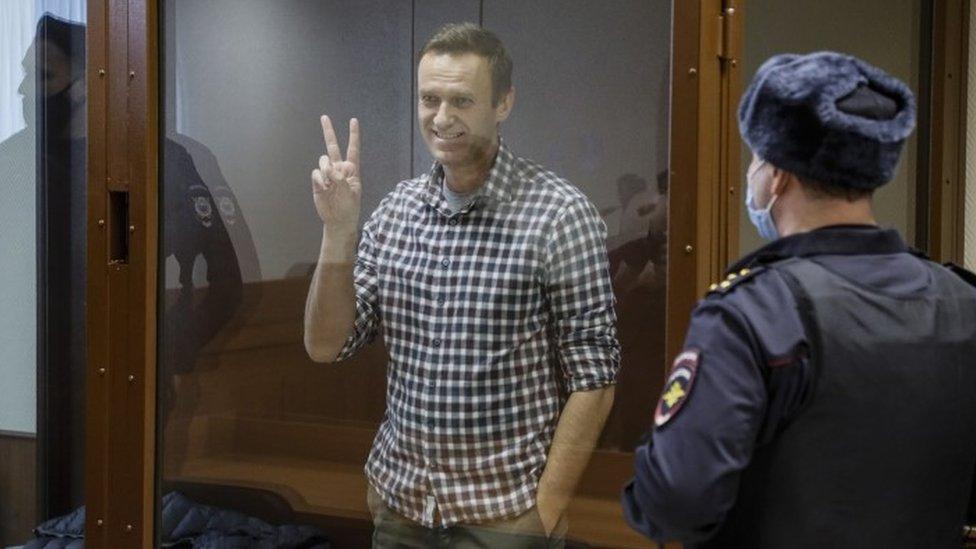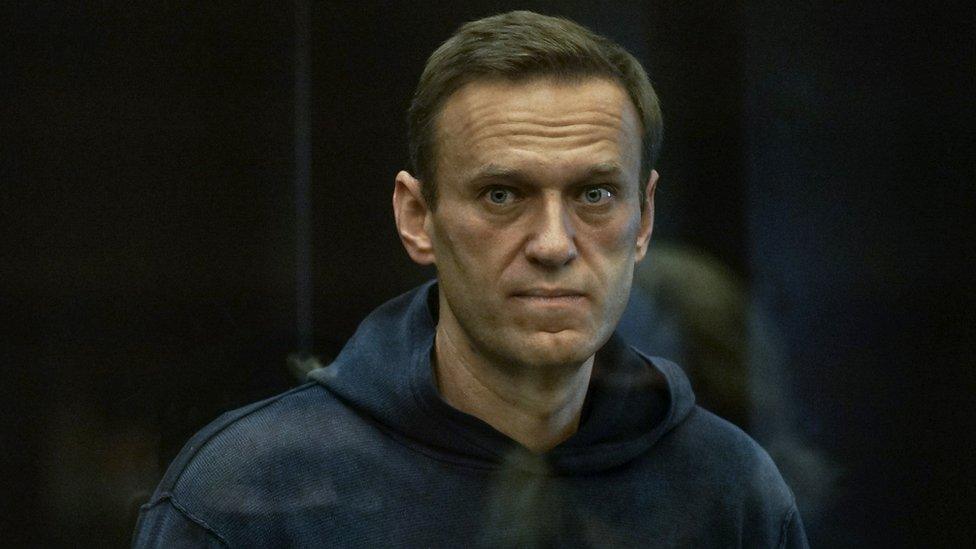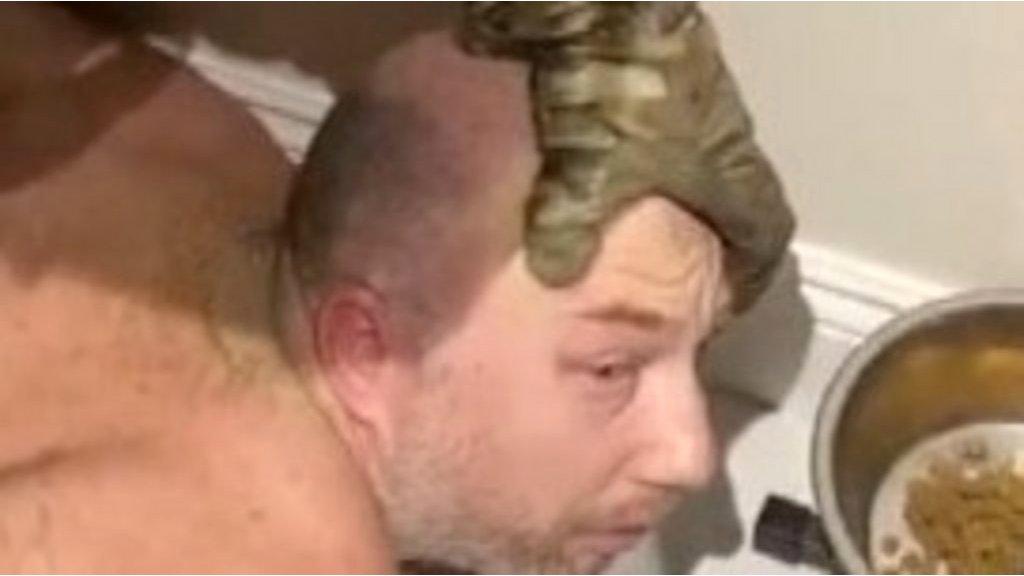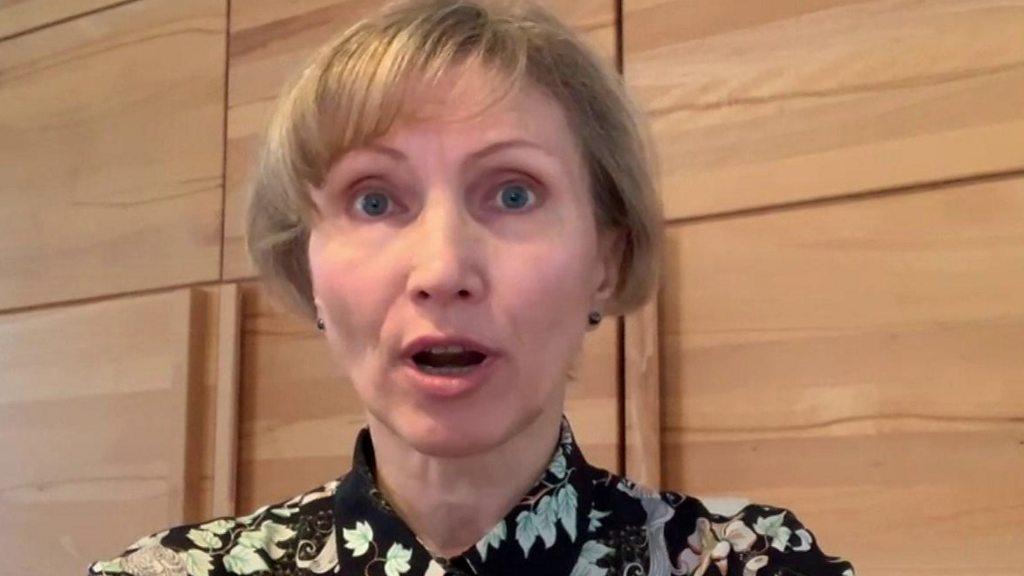Alexei Navalny: Putin critic loses appeal against jailing
- Published

High-profile Putin critic Alexei Navalny told the court the charges were absurd
Russian opposition leader Alexei Navalny has lost an appeal against his jailing for violating the terms of a suspended sentence.
Navalny was detained last month after returning to Russia from Germany, where he was being treated for a near-fatal nerve agent attack.
He has blamed Russian President Vladimir Putin for the attack and says the charges against him are fabricated.
The Kremlin denies any involvement in his poisoning.
Hours later, he was convicted in the same court of slandering a World War Two veteran and fined the equivalent of $11,500 (£8,200).
The veteran had appeared in a video supporting constitutional reforms, approved last year, which would allow Mr Putin to stand for election for two further terms.
Navalny had accused people appearing in the video of being traitors.
In the first case, Navalny was accused of breaking the terms of a 2014 suspended sentence for embezzlement that required him to report regularly to Russian police.
In court, in a speech that referenced both the Bible and the Harry Potter book series, he argued the charges were absurd as he was unable to report to the police while recovering from the attack.
"The whole world knew where I was," he said. "Once I'd recovered, I bought a plane ticket and came home."
Navalny spent a month in a Berlin hospital, two weeks of his stay in an induced coma.
In court, he brought up the evil Voldemort from Harry Potter, likening him to Mr Putin and suggesting he would not succumb to attempts to make him feel alone.
Explaining that he is a Christian, Navalny quoted from the Bible: "Blessed are those who hunger and thirst for righteousness, for they will be satisfied."
The judge rejected his case, though he did cut six weeks off the nearly three-year sentence imposed on Navalny. The Kremlin critic will return to the penal colony where he is serving his time.


When he was led into the dock, Alexei Navalny made the V for Victory sign.
But when the judgement came he had little to celebrate.
His prison sentence was upheld (though reduced slightly, by a month-and-a-half).
With its most vocal critic off to prison, the Kremlin will be hoping it has neutralised the threat he poses as an anti-corruption campaigner and as the only opposition leader in Russia capable of bringing large crowds onto the streets nationwide.
Moscow will now expect more criticism and pressure from the West. This week President Putin's spokesman accused America and Europe of talking about sanctions with "maniacal persistence".
But the Kremlin will try to turn Western criticism in its favour - to bolster the official narrative that Navalny is a Western stooge and that Russia is a country under siege.

The European Court of Human Rights, of which Russia is a member, says Navalny should be released out of concern for his life. But Russia said the call was "unlawful".
Navalny's supporters see the charges as an attempt to silence him and thwart his political ambitions.
He has been a persistent thorn in the side of President Putin, making allegations of corruption including a claim the president owns a lavish palace by the Black Sea.
Navalny's allies are seeking to challenge pro-Kremlin parties in parliamentary elections this year, and President Putin warned on Thursday against foreign interference.
The Kremlin was dismissive on Saturday, its spokesman Dmitry Peskov telling reporters Navalny's political future was "absolutely none of our business".
All citizens have "the right to elect and be elected", he said, "all citizens who are somehow not affected in their rights in accordance with our Russian laws".
Alexei Navalny: what you need to know
European foreign ministers are set to meet on Monday to discuss imposing further sanctions on Russia over the case.
There are divisions among EU members, with Germany going ahead with the Nord Stream 2 project which would transfer gas directly from Russia to Germany.
The project is opposed by Poland and the Baltic states. On Friday Lithuania said it should be paused until after September's parliamentary elections in Russia.
Related topics
- Published4 February 2021

- Published13 February 2021

- Published17 February 2021
